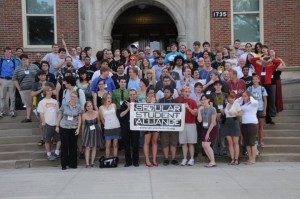 If you read blogs like Pharyngula, you’ll occasionally see debates about what atheists or “skeptics” as a class should do. Recent example of the “skepticism” variety here. And there’s something these debates often seem to miss: “atheist” groups do a lot of different stuff. I’m going to keep this short because I’m in San Diego right now and want to run off and enjoy the city, but expect a follow up next week.
If you read blogs like Pharyngula, you’ll occasionally see debates about what atheists or “skeptics” as a class should do. Recent example of the “skepticism” variety here. And there’s something these debates often seem to miss: “atheist” groups do a lot of different stuff. I’m going to keep this short because I’m in San Diego right now and want to run off and enjoy the city, but expect a follow up next week.
Here’s one example of what “atheist” groups do: When I was living in Indiana in a fairly “red” area, I got the impression that a big purpose of the local atheist group was to help non-religious people find each other so that they didn’t feel so isolated. We actually had one woman who couldn’t be “out” about her atheism because she worked for a religious university.
On the other hand, in more “blue” areas, it’s easy to find people who aren’t at all religious, so feelings of isolation aren’t such an issue, and there isn’t so much of a need for atheist groups to act as support groups. Local atheist groups tend to be more discussion groups for atheists who especially like talking about religion and related issues (though the Indiana group was that too, to an extent).
Then you have national atheist organizations which in some cases exist to support local groups, but also do a whole different bunch of stuff. In some cases, it’s worth noting, that stuff could be done by a religiously neutral organization. For example, any lawsuit over a violation of church-state separation is something that could be done by the ACLU. There may be some benefit to having specifically atheist orgs doing church-state legal work (I haven’t really thought about that issue), but in principle that doesn’t have to be with in the domain of “atheist” groups.
Now there’s a lot of crossover appeal between the different goals that “atheist” groups work on. So it makes sense to have one organization trying to do multiple things, and to have organizations doing different things network with each other. But when we talk about what “atheists” should do, we have to realize that the answer to that question depends a bit on what kind of atheist group we’re talking about. For example, I like nerdy discussion groups, but I’m not sure gender imbalance in nerdy discussion groups is a problem that really needs to be fixed.
Like I said, follow up next week, but for how I recommend this guest post at Massimo Pigliucci’s blog. Ta ta for now.

Chris,
Of course, one of the issues here is the problem of “negative definition.” There is really no more reason to expect atheists to get together, share common interests, have similar personality types, etc. than there is to expect the same of non-Moslems (“aMoslems”), non-Mets fans (“a-Mets fans”), etc.
I suppose there is one exception here: since atheists are stigmatized in the USA, they do have the common experience of being stigmatized. But, if that common experience disappears, then, it is hard to see the point of any sort of pan-atheism.
Dave Miller in Sacramento
It’s worth remembering that most atheists are simply invisible. They get on with their lives in the ordinary way without bothering to join groups, make their views known, debate or protest. For every atheism activist there are at least ten others who don’t take an active part. And if we want to get these people to stand up and be counted other than once every five years in the census, we need to give them the kind of groups and the kind of activities that they want.
There will always be a great silent majority — nothing wrong with that. But we need to make it clear that anyone who does want to go public with their atheism will find others who are willing and able to support them. That’s why attempts to identify the atheist movement wholly with other movements like feminism or gay rights are dangerous and counter-productive.
@Jon Jermy: The goals you mention are noble ones, but they’re just a couple of the goals atheist groups can be devoted to.
But I’m not sure the solution to the census problem is to get more people involved in atheist groups. I suspect it would be better to imitate the British Humanist Association’s census ads.